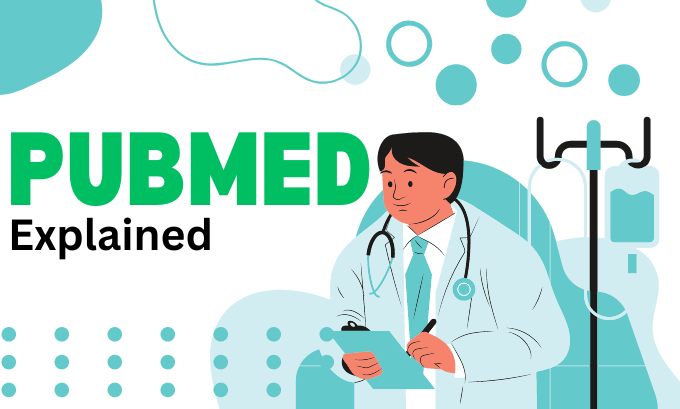PubMed, In today’s rapidly advancing world of medicine, staying informed and connected to the latest research is crucial for healthcare professionals, researchers, and students. PubMed, often regarded as the crown jewel of medical databases, serves as the ultimate resource for accessing a vast repository of biomedical and life sciences literature. In this comprehensive guide, we will not only explore PubMed’s features but also delve deeper into its evolution, significance, and the remarkable ways it’s shaping the future of medical research.
Understanding PubMed: The Bedrock of Medical Knowledge
PubM ed, a creation of the National Center for Biotechnology Information (NCBI), stands as an unparalleled bastion of biomedical and life sciences knowledge. This monumental platform is home to millions of peer-reviewed articles and research papers, acting as a lighthouse guiding us through the sea of medical information.
Understanding PubMed: Your Gateway to the World of Medical and Scientific Literature
Pub Med is a widely recognized and authoritative online database of medical and scientific literature, primarily focused on biomedicine, healthcare, and life sciences. It is maintained by the National Center for Biotechnology Information (NCBI), a branch of the National Library of Medicine (NLM) at the National Institutes of Health (NIH) in the United States.
Pub Med serves as a comprehensive resource for researchers, healthcare professionals, students, and anyone interested in accessing peer-reviewed articles, research studies, clinical trials, and other valuable sources of medical information. The database contains millions of citations from a vast array of journals, magazines, and research publications, covering a wide range of topics related to medicine, biology, pharmacology, genetics, and more.
One of Pub Med’s key features is its user-friendly search interface, which allows users to perform advanced searches, apply filters, and access full-text articles when available. Additionally, Pub Med provides access to related resources such as Pub Med Central (PMC), an archive of free, full-text biomedical and life sciences journal articles.
Researchers and medical professionals rely on Pub Med to stay up-to-date with the latest advancements in their fields, conduct literature reviews, gather evidence-based information, and contribute to the advancement of medical knowledge and healthcare practices.
In summary, Pub Med is a vital tool for accessing and disseminating scientific and medical research, making it an indispensable resource for the global healthcare and research communities.
Why PubMed Matters: A Pillar of Medical Research
- Expansive Knowledge Base: PubM ed boasts an extensive collection that spans diverse medical disciplines, catering to the most intricate research inquiries, from the molecular level to clinical practice.
- User-Friendly Interface: Pub Med’s user-friendly interface and advanced search capabilities ensure that it’s accessible to both novices and seasoned researchers. Its intuitive layout allows users to navigate seamlessly, making it a go-to platform for medical research.
- Open Access: A significant portion of Pu bMed’s content is freely accessible through Pu bMed Central. This commitment to open access ensures that knowledge is shared globally, transcending geographic and financial barriers.
Key Features of PubMed: Your Research Arsenal
- Advanced Search Tools: Master the art of crafting precise search queries using Pub Med’s advanced search tools. Employ Boolean operators and various search fields to refine your queries, ensuring that you retrieve the most relevant articles efficiently.
- PubMed Central: Dive into Pu bMed Central, a subsection offering unrestricted access to full-text articles. This invaluable resource enhances the depth and breadth of your research, providing instant access to comprehensive literature.
- Author Profiles: Identify and connect with experts in your field through Pub Med’s author profiles. Building professional relationships and fostering collaboration has never been easier.
Harnessing PubMed’s Full Potential: A Researcher’s Guide
- Optimized Search Queries: Learn the art of constructing finely-tuned search queries. By mastering this skill, you’ll unearth articles directly relevant to your research interests, saving valuable time.
- Filter Magic: Take advantage of Pub Med’s myriad filters. Whether you’re narrowing down results by publication date, article type, or study design, these filters are your trusty companions on the journey to pinpoint the most pertinent literature.
- Save and Share: Maximize your productivity by utilizing the “Save Search” feature. This allows you to revisit and build upon your research findings seamlessly. Additionally, you can share your findings with peers, promoting knowledge dissemination.
PubMed vs. Google Scholar: A Critical Comparison
While Google Scholar serves its purpose, especially for general research, Pub Med distinguishes itself as the unrivaled choice for biomedical research. Its specialized focus and exhaustive coverage of medical literature make it the preferred resource for professionals and researchers alike.
The Evolution of PubMed: Adapting to the Future
PubM ed’s journey has been marked by continuous evolution to align itself with the dynamic landscape of medical research:
- LinkOut: PubMed’s LinkOut feature seamlessly connects you to full-text articles available through your institution’s library, providing instant access to valuable resources.
- Mobile Accessibility: Acknowledging the growing need for on-the-go research, PubMed offers a responsive and intuitive mobile version. Now, you’re never far from the information you need.
- PubMed Labs: An experimental platform within Pub Med, Pub Med Labs lets you explore cutting-edge features and provide feedback. By actively engaging with the platform, you play a role in shaping the future of medical research tools.
- Customization: Tailor Pu bMed to your preferences by creating a My NCBI account. This allows you to save searches, set up alerts, and curate your personal library of references, streamlining your research journey.
- PubMed APIs: For developers and data enthusiasts, Pub Med offers Application Programming Interfaces (APIs). These interfaces enable the integration of Pub Med data into various applications, fostering innovation in healthcare technology.
The Future of Medical Research with PubMed: Where Innovation Thrives
As we gaze into the future, Pub Med continues to evolve, adapting to the changing needs of the global medical community. With the rise of artificial intelligence, PubMe d is poised to revolutionize how we discover, analyze, and apply medical knowledge.
In conclusion, P ubMed isn’t just a database; it’s a dynamic, ever-evolving ecosystem designed to empower medical professionals, researchers, and students. It’s the beacon guiding us through the vast sea of medical information, helping us uncover breakthroughs, make informed decisions, and ultimately, enhance the quality of healthcare worldwide.
By harnessing the full potential of Pub Med, you are not merely accessing information; you are unlocking the power to drive progress in the world of medicine.
Free Medical Course With Certificate



